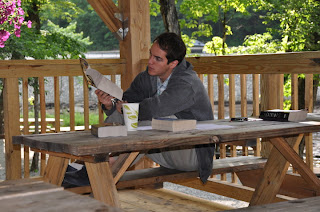This week’s lectionary text from John 21:1-19 includes the story of the post-resurrection disciples going back to what they knew best before following Jesus. They went back to Galilee, pushed off in one of their old boats and went fishing.
Many of us have done the same when we needed some quiet time of reflection and/or spending time with friends in a relaxing atmosphere. Like many other little boys, I have spent many hours over the course of my life enjoying time in "fishing contemplation."
A Time of Loss and Fear
Going fishing probably seemed like a good idea to the disciples as well. They had lost the leader whom they had been sure was the Messiah. Then after Jesus’ death, they had spent most of their time in hiding from the authorities that they knew would surely come for them.But Jesus had been the one to find them, locked in a room, scared out of their wits and seemingly without hope of a future.
After this exhausting ordeal, who would blame them for needing a vacation? Even if it was a working one. Maybe, they thought, it would be easier to fish for fish, and not men. But it seemed that the fish weren’t biting that day.
Try Something New
Then a “stranger” on shore shouted to them from the shore. “Throw your nets on the other side of the boat!” the stranger said. Now, I’ve heard of backseat drivers before but shore-side fishermen!?! But when the disciples complied to his suggestion, low and behold their net was fill with so many fish, they could barely drag it to shore much less into the boat.This story leaves us with a question. Was Jesus’ just encouraging the disciples to try a new way to catch fish? Or was he using a metaphor, as he often did with his disciples, concerning the future of their ministry. I believe it is both.
photo by Mac Brown
A Metaphor for Today
It would appear that the metaphor is certainly relevant for ministry today. The Barna Group, which has been tracking the statistics of how Americans approach their faith, has much to say about the importance of casting our nets in new ways.David Kinnaman, president of the Barna Group, has consolidated the info about how young adults view "the church" into a video called You Lost Me (click on the title to watch the video).

Tom Ehrich, a writer, church consultant and Episcopal priest based in New York., recently added some insights into the some of the challenges that modern day churches face in his article Change or Die (click on the title to see the article). In his article, Tom points out the many changes in our culture and the need for the church to "cast its nets" in new and different ways.
The Good News
Even in light of those dire predictions, there is good news for the Bryson City UMC. We have been casting our nets in new ways already through the River of Life summer ministry on the Nantahala River and this summer we will launch a new ministry on the Tuckaseegee River in Dillsboro, NC. Both of these ministries reach out to active young adults.Stone Soup gatherings are held on Sunday evenings to serve the hungry in our community and offer a forum for exploring our Christian faith in an open setting.
With the renovation of the Fellowship Hall, our church will be able to offer a contemporary Praise & Worship type service. This style of worship directly appeals to the young adults in our community. We are still working out the details but most of the planning will be driven by young adults.
Image from The Wisdom Journal
Casting Together
As we have seen from the story of the disciples, when casting our nets, it is important for all of us to be pulling together. Each of us has our own job, our own area of ministry, as we work toward bringing God's Kingdom on earth.It is my prayer that we continue to pull together, as one of the most loving churches I have experienced, to share the love of Christ with others of our community in traditional and fresh ways.







